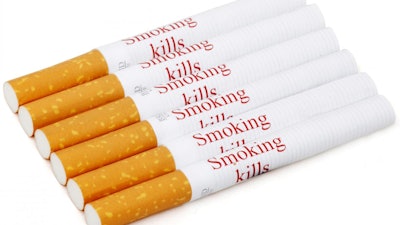
Health warnings printed on individual cigarettes could play a key role in reducing smoking, according to new research from the University of Stirling.
Experts from Stirling's Institute of Social Marketing examined smokers' perceptions of the warning 'Smoking kills' on individual cigarettes - as opposed to the message only appearing on packs.
The team, led by Dr Crawford Moodie, found that smokers felt the innovative approach has the potential to discourage smoking among young people, those starting to smoke, and non-smokers.
Participants felt that a warning on each cigarette would prolong the health message, as it would be visible when taken from a pack, lit, left in an ashtray, and with each draw, thus making avoidant behavior more difficult.
The visibility of the warning to others was perceived as off-putting for some because it was associated with a negative image. Within several female groups, the warnings were viewed as depressing, worrying and frightening; with it suggested that people would not feel good smoking cigarettes displaying a warning.
The possibility of warnings on cigarettes is included in the Scottish Government's tobacco-control action plan, 'Raising Scotland's Tobacco-free Generation'. It suggests changes to "colour, composition and/or warning messages on each stick".
The Canadian Government have also held a consultation on the proposals and published their findings earlier this month [August 2019].
The Stirling study canvassed the opinion of 120 smokers, aged 16 and over, in 20 focus groups held in Edinburgh and Glasgow in 2015. Within every group, participants felt that warnings on individual cigarettes would potentially have an impact on themselves or others.
"The consensus was that individual cigarettes emblazoned with warnings would be off-putting for young people, those starting to smoke, and non-smokers," Dr Moodie said. "This study suggests that the introduction of such warnings could impact the decision-making of these groups. It shows that this approach is a viable policy option and one which would - for the first time - extend health messaging to the consumption experience."
The research - funded by Cancer Research UK - also involved: Dr Rachel O'Donnell, Joy Fleming, Dr Richard Purves and Jennifer McKell (all of the ISM at Stirling), and Fiona Dobbie, of the Usher Institute of Population Health at the University of Edinburgh.
Professor Linda Bauld, Cancer Research UK's prevention expert, said: "Too many young people are still taking up smoking. Government anti-smoking campaigns and tax rises on cigarettes remain the most effective methods to stop young people starting smoking, but we need to continue to explore innovative ways to deter them from using cigarettes to ensure that youth smoking rates continue to drop.
"This study shows that tactics like making the cigarettes themselves unappealing could be an effective way of doing this."






















